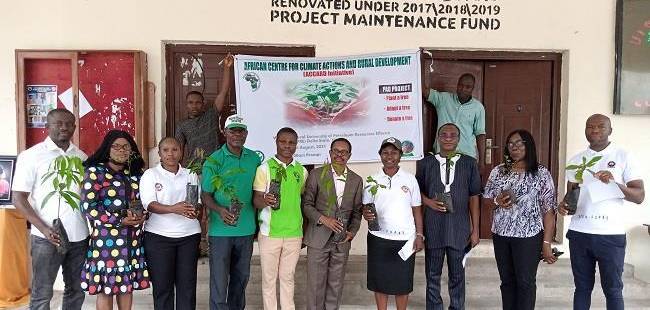
The African Centre for Climate Actions and Rural Development (ACCARD) Initiative ”, was established as a legal and national entity in 2019 under the aegis of the Nigerian Corporate Affairs Commission (CAC) in Abuja, after more than seven (7) years of promoting environmental and climate activities, as well as projects in the Niger Delta, Nigeria, as the Center for Environment and Sustainable Livelihoods Projects (CESLP). One of its many projects has as its theme “ the state of the environment of the Niger Delta”. The program, among others, emphasizes capacity development and participation of young people, as well as community participation in environmental management. ACCARD strongly believes in " attitude change " and as such is committed to building environmentally conscious societies in Africa and to uplifting future leaders through a "catch it young" approach.

The Center also campaigns for good governance and policy implementation in partnership with notable non-governmental organizations (NGOs), universities, governmental and international organizations, as well as multinational corporations operating in these communities.
The functioning of ACCARD (and the previous CESLP) over the past 7 years, as a community organization, has greatly contributed to human capacity and the development of society, and has made the ACCARD Initiative the one of the leaders of the United Nations (UN) Sustainable Development Goals (SDGs), in particular goals # 13 and # 17, namely climate actions and partnership respectively.
The organization was founded by Elohor Freeman OLUOWO.
The ACCARD initiative uses a proactive approach that is divided into 5 areas of intervention:
Coordination
In collaboration with relevant local and international stakeholders, ACCARD will coordinate the efforts that do so;
- Educate people on relevant climate and / or environmental management (including plastics in the environment), social and health issues.
- Organizing African communities negotiate their own prosperity by identifying and contributing to personal development through planning and participation.
- Collaborate with governments at all levels, multinational agencies and international communities for the development of Africa, especially rural communities and less privileged groups.
- Collaborate with donor organizations in areas of common interest and support decent livelihoods. As well as key players in government, communities and institutions to develop improvement strategies.
- Organize activities that will make the voice of the community heard, especially for disadvantaged and disadvantaged people (with inadequate health facilities, portable water and poor environmental sanitation), and lobby for support 'improvement of these inadequate conditions and improve the standard of living.
- Promote societal development through good governance
- Promote agricultural initiative and science and technology for community development projects.
- Initiate and support environmental clubs in secondary and tertiary institutions in the States and Nigeria.
Advocacy and resource mobilization
Increase awareness of climate change and measures that will promote mitigation and reduction of greenhouse gases.
- Increase awareness of the principles of sustainable development and environmental management.
- Promote the implementation of sustainable community livelihood projects, such as portable water supply, good sanitation systems, free medical and health services and best environmental management practices, etc.
- Promote green development and sustainable protection of the environment (including plastic pollution) in accordance with international best practices.
- Promote societal innovation and development through good governance.
- Promote gender and girls' rights (including the eradication of early marriage), as well as inclusion in different sectors of society.
- Liaise and lobby multinational organizations on projects with identified community needs.
- Liaise with African governments, from local to federal level, in particular constituency and community representatives on identified projects.
Empowerment and community projects
Engage in meaningful immersion projects beneficial to the population, aimed at improving local livelihood standards and options. The Center will identify community needs through an organized consultative forum (i.e. town halls) and other focus group meetings (youth, men and women) in state communities. from Afrcian. In addition, prioritize similar actions based on their needs and benefits. ACCARD Initiative, will vigorously pursue the following projects, but not limited to:
a) Portable and good quality water sources
b) Build and maintain sanitation systems
c) Provide free medical and health services
d) Promote girls' education
e) Agricultural / storage and processing facilities.
f) Empower graduates of skills training programs at the center
g) Empower farmers with tools / equipment and training. Promote innovation, research and development to improve the climate and agricultural performance of identified communities, in addition to climate change adaptation programs.
Innovation, research and development studies (inventory, evaluation and feasibility)
The Center, with its experienced professionals, will be involved in different study needs and, as such, will carry out innovative studies, research and development, evaluation, feasibility and inventory in the fields of the environment. , health, agriculture and social issues. The same will be documented for the purposes of:
A) Formulation of government policies and programs b) Document the results in the form of research and library documents, as well as policy documents.
C) Carry out a needs assessment which will assist the Center in initiating, implementing and executing projects.
D) To enrich the magazines and information media offered by the Center.
E) Exchange knowledge and seek local and international support in areas where community needs are met.
F) And other activities that will promote ACCARD's activities.
Training
The Center will participate in various training and community needs in the areas of environment, health and agriculture. The aim is to promote sound approaches to environmental and climate management, to increase the workforce and capacities of young people in different sectors of the African economy, as well as to build the capacities of use. The ACCARD initiative will also provide entrepreneurial craft skills and practical knowledge in oil spill management, water treatment, safety and first aid, and other environmental aspects.
In order for the objectives to be achieved, it is necessary to:
a) Increase the capacities of young people (through specialized training, workshops, conferences and seminars) and mentoring programs.
B) Increase community awareness of the principles of sustainable and green development, as well as environmental management.
C) Pursue the change in attitude towards environmental protection through environmental clubs established in secondary and tertiary establishments, as well as community environmental monitoring groups.
D) Produce an environmental magazine, “De Environment”, “Environmental change reporters”, “African Environment Health Newsletter” to increase environmental and health awareness and present livelihood projects.
E) Promote innovation, agricultural development, science and technology for community development projects.
Posted on 2021-09-09 16:13









Comments